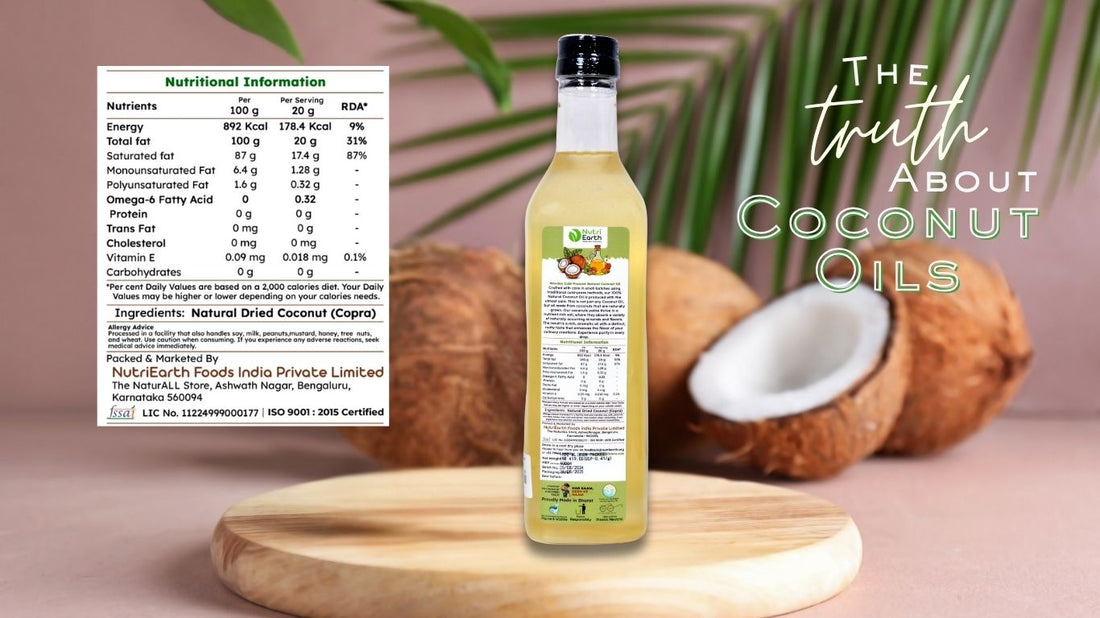
The Truth About Coconut Oils – How to Pick the Best
Share
The TRUTH About Coconut Oils – How to Pick a Good Coconut Oil
Walk into any health aisle today, and you’ll spot it gleaming from the shelves—coconut oil. It promises everything from glowing skin and luscious hair to better digestion and sharper thinking. But here’s the truth no one tells you: not all coconut oils are created equal.
Some are packed with pure goodness, while others are stripped of nutrients and dressed up with fancy labels. So, how do you tell the difference between what’s genuinely good for you and what’s just clever marketing?
Whether you're tossing it into your smoothie, massaging it into your scalp, or using it as a makeup remover, the quality of your coconut oil matters, a lot.
This guide will walk you through everything you need to know—from benefits and decoding labels to red flags and smart storage tips—so you can confidently choose the good coconut oil for your lifestyle and health.
Let’s peel back the label and uncover the truth.
Cold Pressed Coconut Oil Benefits
Before we dive into what makes a good coconut oil, let’s look at why it deserves a spot in your home in the first place.
Coconut oil is a rich source of medium-chain triglycerides (MCTs), especially lauric acid, known for its antibacterial, antiviral, and anti-inflammatory properties. It's considered a heart-healthy fat and a natural immune booster.
Benefits of coconut oil include:

-
Moisturizing dry skin and soothing skin irritations.
-
Strengthening hair and reducing breakage.
-
Supporting gut and digestive health.
-
Providing a quick energy boost, especially for brain function.
-
Acting as a natural antimicrobial agent for oral hygiene and wound care.
So yes, the hype is real—coconut oil is healthy but only when you're using coconut oil in its purest form.
Decoding the Labels
With so many options on the market, reading the label is your first step to finding high-quality coconut oil.
Here’s what to look for on the bottle:
-
Cold Pressed Coconut Oil: Extracted without heat, preserving natural nutrients and antioxidants.
-
Virgin or Extra Virgin: Made from fresh coconut meat (not dried copra), unrefined and chemical-free.
-
Unrefined: Indicates no bleaching, deodorizing or refining—this keeps the oil close to its natural state.
-
100% Pure: Should contain only coconut oil—no additives, fragrances or preservatives.
Avoid coconut oil that doesn't clearly state its extraction method or contains vague terms without explanation.
Cold Pressed Coconut Oil Uses – In the Kitchen, Bathroom & Beyond
The beauty of cold pressed coconut oil is in its versatility. It’s not just a cooking fat—it’s a lifestyle product.
In the kitchen:
Great for sauteing and baking due to its stable structure at high temperatures.
Can be blended into coffee or smoothies for a metabolism boost.
Acts as a natural preservative in homemade snacks and granola bars.
In personal care:
An effective moisturizer for dry, sensitive skin.
Gentle makeup remover—even your stubborn waterproof mascara.
Helps reduce dandruff and improve scalp health when massaged into the roots.
Other creative uses:
Ingredient in DIY lip balms, scrubs and body butter.
Oil pulling for oral detox and fresher breath.
When using coconut oil in these ways, the quality becomes even more important.
What Makes a Coconut Oil Good?
You now know how to read a label, but what really sets high-quality coconut oil apart?
1. Source of Coconuts: Look for oils made from fresh, organically grown coconuts.
2. Processing Method: Cold-pressed and unrefined retains the natural enzymes, antioxidants, and flavour.
3. Packaging: Glass jars or BPA-free containers are best. Coconut oil can absorb chemicals from low-quality plastic, especially in warm conditions.
4. Aroma and Taste: A good coconut oil has a mild, sweet coconut aroma—not overpowering or artificial.
If it smells or tastes “off” or looks cloudy when in liquid form, it may be stale or of low quality.
Red Flags – How to Spot Low-Quality Coconut Oil
To protect your health (and your wallet), here’s how to identify poor-quality coconut oil:
Vague or missing information about how the oil was processed.
Unnaturally low price – a red flag for mass-produced or refined oil.
Artificial fragrance or yellowish tint – pure coconut oil is white when solid and clear when melted.
Stored in clear plastic bottles, allowing light to degrade the oil.
Label doesn’t say cold-pressed, virgin, or unrefined.
Low-quality oils may still look okay at first glance but lack the nutrients that make coconut oil so beneficial.
Final Tips – Choosing and Storing Coconut Oil
Once you’ve chosen your good coconut oil, make sure you store it right to keep it fresh and effective:
Buy smaller jars if you don’t use them daily.
Keep it in a cool, dark place like a pantry or cabinet.
Avoid letting water get into the jar, which can lead to spoilage.
Seal it tightly after each use to avoid oxidation.
No need to refrigerate it—coconut oil naturally solidifies below 24°C and melts easily when needed.
Cold pressed coconut oil is more than a trend. It's a time-tested natural remedy, a beauty essential, and a kitchen staple—all rolled into one. But like anything, quality makes the difference between results and disappointment.
So, next time you’re browsing for coconut oil, remember that you're not just buying oil. You're investing in your wellness. Choose cold-pressed, unrefined, virgin coconut oil that’s stored with care because when it comes to coconut oil, nature gives you everything—you just have to know how to pick it.
Frequently Asked Questions
1. Is coconut oil really healthy for everyday use?
Yes, when used in moderation, it provides healthy saturated fats like lauric acid and has antioxidant benefits.
2. Can I cook with cold-pressed coconut oil?
Yes, it's great for low to medium-heat cooking and retains nutrients better. It also adds mild coconut flavour dishes.
3. How can I tell if coconut oil is pure or adulterated?
Pure oil has a mild coconut aroma, solidifies below 24°C, and is free of additives.
4. Is virgin coconut oil better than refined coconut oil?
Yes, virgin oil is less processed, chemical-free and retains more nutrients and natural flavour.
5. What’s the difference between cold-pressed and regular coconut oil?
Cold-pressed is extracted without heat, preserving nutrients; regular oil is often refined using heat and chemicals like hexane or sodium hydroxide.




